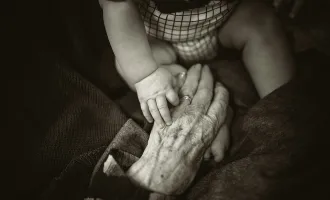This Date in UCSF History: Students Aim to Improve Heath Care in Iraq
Originally published on March 26, 2009.
When U.S.-led coalition forces invaded Iraq in March of 2003, a social, political and economic reshuffling began for the entire Middle East.
To be sure, this persistent conflict has created incredibly varied outcomes for the geopolitics of the region and for the Iraqi population.
These changes range from democratically elected leaders in Baghdad to fanning the flames of a complicated rivalry between Sunni and Shia Muslims that spans across nations.
Academics and historians will undoubtedly be evaluating and re-evaluating the impact of this war for generations to come.
One thing, unfortunately, has remained consistent: access to quality health care for Iraqis has significantly deteriorated. In addition to the violent chaos that pervades in Iraq, much of the health-care infrastructure — from delivery to training of new health care workers — has either collapsed or been severely damaged.
According to an Inter Press Service (IPS) article from February of this year, “Seventy percent of Iraq’s doctors are reported to have fled the war-torn country in the face of death threats and kidnappings. Those who remain live in fear, often in conditions close to house arrest.”
Existing facilities are stretched beyond capacity, and the shortage of health care professionals also means a sharp decrease in the number of individuals capable of training Iraq’s next generation of providers.
Dr. Jess Ghannam, Clinical Professor of Psychology and Global Health Science at UCSF, attributes the deleterious state of health care in Iraq directly to U.S. operations.
“The Iraqi health care system has been devastated by the invasion and occupation of Iraq by U.S. and allied forces and it will take decades to rebuild.”
The current state of Iraqi health care is a far cry from the days before March 2003.
A Newsweek article from October of 2008 describes Iraq’s health care system under Saddam Hussein as the “envy of the Arab world” even despite the ruthless dictator’s “misrule.”
“[People came from all over the region to study medicine or seek treatment.”
In the years following the 2003 invasion, the murder, exile, and kidnapping of physicians has erased some medical specialties completely, including those with training in advanced prosthetics.
Also, of the several hundred psychiatrists in Iraq before the war, only 80 remain to manage the impact of six violent years on an entire nation.
Crisis Health Initiative (CHI) formed as a call to action in response to just these sorts of circumstances.
Allen Andrews and Melinda Morton cofounded CHI in October 2007 while studying at the Bloomberg School of Public Health at Johns Hopkins University.
CHI is a coalition of progressive thinking medical and public health professionals, concerned citizens and partner organizations.
They work to facilitate academic partnerships and educational programs to provide humanitarian assistance to physicians and health-care professionals during times of crisis.
The hope is that leaders can develop locally-led, long-term humanitarian assistance programs from the training they receive at partner institutions.
As part of CHl’s mission, to build academic partnerships, student chapters are beginning to pop up at medical schools and public health schools around the United States.
One of the first student chapters opened in Andrews hometown of San Francisco at UCSF. The student chapter at UCSF is the first and only medical school so far under CHl’s national umbrella.
They are working to facilitate an exchange where two Iraqi physicians will enroll at nearby UC Berkeley School of Public Health to attend classes and engage with other health professionals.
The students from UCSF are charged with gaining support from university administration, raising funds as well as coordinating speaking events and panels to educate members throughout the university community about medical conditions abroad.
Also, members of the CHI UCSF chapter are hopeful that they can help CHI expand to other U.S. medical schools and create more opportunities for collaboration, exchange, and international dialogue among health care providers.
Dr. Ghannam is also the faculty advisor for the UCSF student chapter of CHI.
“Part of our moral and ethical responsibility as health care professionals is not only to speak out against these acts of violence, but to offer our assistance, support and help in the re-building process.”
“The UCSF Crisis Health Initiative is but one step in the process of facilitating this process by offering an opportunity for UCSF students to actively participate in some pro-active activities to help Iraq and Iraqi physicians re-build hospitals, clinics, and schools.
As a way to raise community awareness about the dire state of health in Iraq, the student chapter is holding an event titled “Health Consequences of the Iraq War”.
The event will feature prominent voices on the status of Iraqi health care Dr. F. A. Al-Alusi, Department Head of Internal Medicine at Baghdad University and Dr. Eric Stover, Director of the Human Rights Center at the UC Berkeley School of Public Health.
Dr. Ghannam also believes the event is a symbolic welcoming of CHI to the schools of allied health.
“I hope that the UCSF community will join us on April 3rd for the initiation of the UCSF CHI Chapter.”
As well as connecting local Bay area health professionals in an important and informative forum, the event also hopes to raise money to support the physician exchange scheduled for this coming fall.
Drs. Ghannam, Morton, the students at UCSF and Mr. Andrews are all critical players in this unfolding saga.
Iraq is a place where consistency is often in short supply, thanks to the work of this unique and special group, hopefully the unraveling of the health care system will begin to display some new trends as well.



